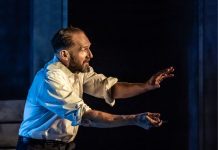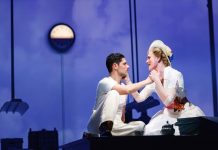LeeAnét Noble comes from a long line of an amazing family of local theater makers, and she’s keeping it all in the family as the new artistic director of Adventure Theatre, DC’s longest-running children’s theater and pre-eminent musical theater training academy for youth. A former child stage actor herself, she’s a natural for making the connection between family, the performing arts, and theater for young audiences.
A DC native and alum of Howard University’s famed Department of Performing Arts, Noble ascends to the position after a nationwide search. She succeeds Chil Kong, who resigned in August following staff complaints about harmful employment practices. Adventure Theatre is celebrating its 70th jubilee with plans in the works for 2022–23, its 71st season.
Just two weeks into her new role at Adventure Theatre after several years of transformative work as Shakespeare Theatre Company’s director of equity and enrichment, Noble took time to chat with DC Theater Arts about ideas that shape her eclectic dreams “to do everything possible in theater.” LeeAnét Noble is a woman with a plan — action plus art using the immense potential of theater to change lives and transform society by expanding its reach among young people.
(This interview has been edited for length and clarity.)
Ramona: Before we talk about your professional work I’d like to talk a bit about your personal journey in theater. How would you describe it? What was the dream you had?
LeeAnét: I literally grew up in the arts. I did my first show at age two in Cramton Auditorium at Howard University. My mother, Lauretta Malloy Noble, was at Howard at that time, and my grandmother, Loncie Malloy, was also a graduate of Howard University Department of Music and School of Divinity. I fell in love with theater seeing my mother on stage in Santa Claus and the Mother Goose Rock.
I was just a child to the mother in the shoe running around the stage, but I remember being captivated by looking at her. I was like, “I wanna do that too.” She used to produce shows with big celebrities, and I watched her and her mother perform together. She also played the drums and taught me how to play the drums. I pretty much wanted to do everything my mother did. And then once I touched it, once I did it and stepped into it, I felt that energy, I felt that surge.
When my grandmother passed away — I was only six at the time — my family was trying to explain what happened and why everybody was grieving. I had just done my first recital where I got to sing and perform in front of the church. So I said, “Where’s the recital with Mom-Mom that we do together?” And they said, “It’s not going to happen anymore.” It was the first time I felt grief and sadness; I just broke down in tears because these two things were so connected: family and performing. It felt like those two things were gone in that moment. It also showed me how much I loved it.
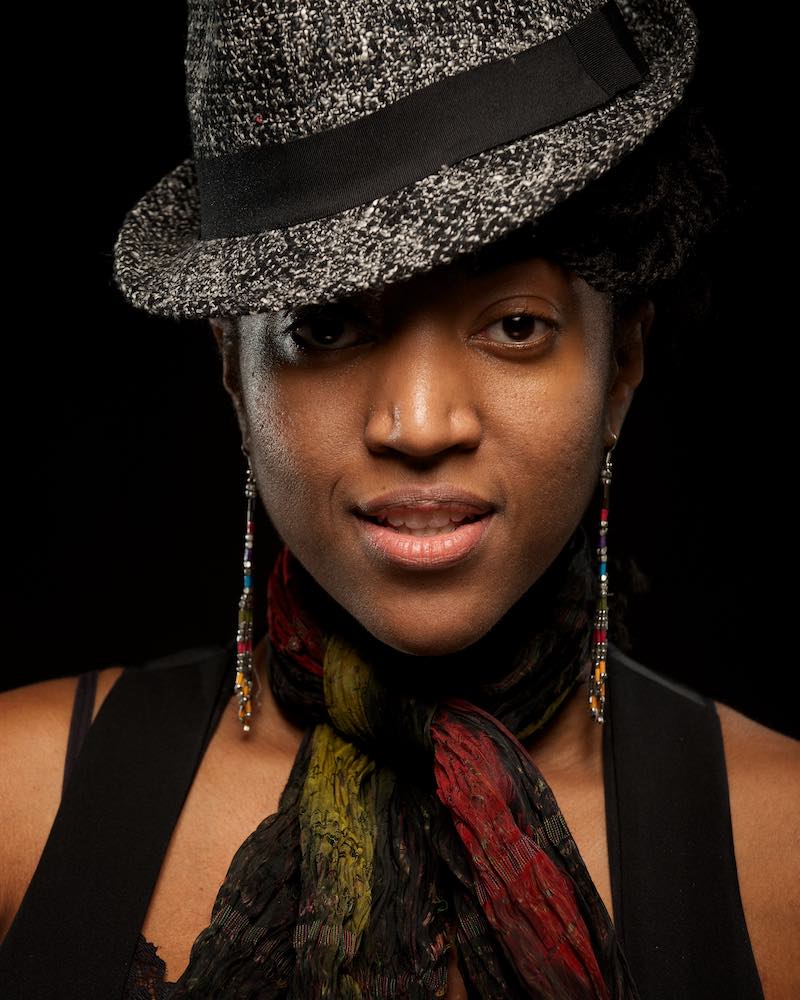
I’m also a writer and a musician and I direct, so the dream has always been to do all that’s possible in this art. I can’t say when I was a kid I wanted to be an artistic director! But I wanted to do everything possible in theater.
What a wonderful background you have with your family being performers. I imagine seeing them on stage gave you the confidence and the belief in yourself that you could do it too. Am I right?
Yeah, I knew it was possible instantly. My grandfather was best friends with Dizzy Gillespie. I grew up spending time with him and running around the Kennedy Center at his events and talking to him. At that time my grandfather was also working at Howard University. Everybody knew Mr. Lawrence Malloy, with the white suits and the hats, and everybody knew my mom. So I have been all throughout that fine arts department since I was literally a baby.
You are not new to children’s theater and theater education with your years at Disney Theatrical Group before your recent work at Shakespeare Theatre Company. So going from Shakespeare to Adventure should be an easy transition for you, shouldn’t it? Or are you expecting creative opportunities at Adventure that might present new and different demands for you?
Well, I’m in that transition right now and the work that I’ve been doing at Shakespeare Theatre Company from an EDI perspective [equity, diversity, and inclusion] — creating anti-racist policies and action plans, connecting with recruitment, directing events and readings, having a voice as part of the artistic team — has created a mixture of action and art that has really prepared me for the transition into Adventure Theatre. My first step is just listening and assessing. There are a lot of positions that I’m going to be creating and hiring. The term of the interim executive director [Jeanne Ellinport] is up, so that search has begun. Usually, if you go into a theater in an artistic director role, everything is preset; you have to come into somebody else’s season and plan from there. But I have the opportunity to make a firm foundation that is fueled by what I’ve learned in EDI and theater spaces over the past 20-some years.
I have a small staff right now, but they are excellent. I feel this is a good opportunity to build something that is truly beautiful for what happens on stage. You know, it’s hard to find that true reflection where both the productions on stage and the inside of the theater are at a certain level. We’ve seen revolutions happening in theaters across the United States and people having to work backward to fix things. This is the opportunity for me to build a foundation and correct it and use what people have shared and what people are experiencing to make a better place.
What excites you about working in children’s theater specifically?
It’s on my path. In the work I did with Disney Theatricals creating and being on the development team for junior and kid packages of productions, I was on the team for Lion King KIDS and Lion King JR., which kids are doing all around the world now. Almost 15 years ago, I started working with Imagination Stage and walked into that space at that time not really knowing the world of children’s theater and TYA [theater for young audiences] and was just captivated. I’ve worked with them ever since. A TYA touring production that I directed for Imagination Stage called 10 Seconds is going back on tour.
My mother and I just finished doing a children’s theater project with Cleveland Play House that was focused on helping young people get through grief. We wanted it to feel like a big hug because there’s been so much in connection to grief focusing on our youngest people, our future, our most precious. There are fun productions that just bring joy, but there’s also a way to infuse social and emotional learning that children don’t get in school, teaching them outside of school where they’re not at a desk but they’re taking it in in different ways.
I really love where children’s theater is going. With the 10 Seconds project for Imagination Stage, COVID happened while I was working on it, so we turned it into a film. And we were seeing police officers break down in tears and young people were saying, “My voice is being heard here.” So many things can happen that will help to shape where we’re going as a society if we start with our children and connect not only entertainment and fun but also learning and coping techniques that might be harder for teachers and parents to get children to absorb.
I’ve also been a teacher for a very long time, and I love working with children, I love working with young people. I think of myself as a big kid in many ways. Having a background in creating curricula and working in education departments everywhere from Cleveland Play House to Manhattan Theatre Club, it’s something that I love.
My mother and I created a program with Brooklyn Academy of Music years back that focused on vision-impaired and blind students. We went in there and we helped to improve cognitive learning and functioning through the arts. It was just so beautiful and so amazing. And the teachers’ response was: This is something that our students never got in physical therapy; their motions are improving so much through dance because they’re not thinking about it in the same way. Also, I did a lot of collaborations with Maryland School for the Blind over the years creating programs.
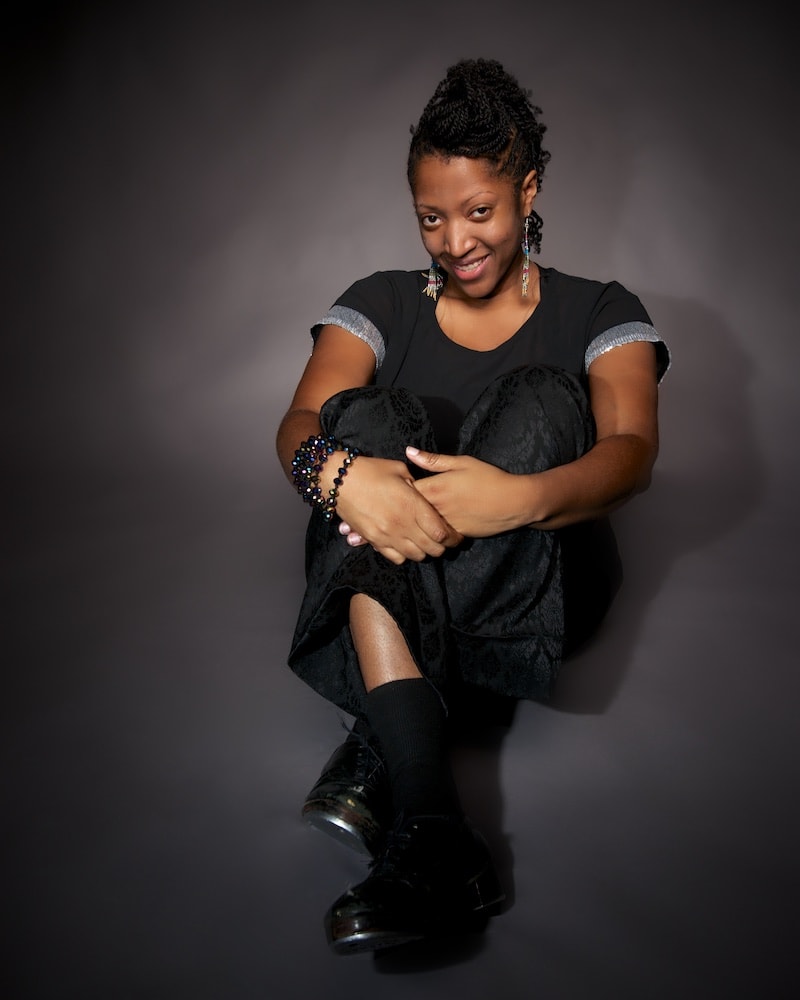
I’m really big on collaborations. My theater friends, other artistic directors, other theaters: how can we connect and create beautiful pieces that connect with the family? I’m excited about all the possibilities.
You’ve said that you want to “make inclusive magic for families.” What does that magic look and feel like? One of the challenges of children’s theater is to make it family-friendly — so parents don’t feel they are going to a children’s production just for their kids. What are your ideas for making shows that parents want to see too?
The focus in the past at Adventure has been on the three-to-six-year-old range. I really want to expand the voices that we show and connect to. For instance, the most recent TYA shows that I have directed are very much pieces that everyone can connect to. It’s about the content that you do and the quality of it. The show my mother and I just did at Cleveland Play House, Teddy Bear Mountain by Lisa Langford, had everything for every age, from passing out little teddy bears to making sure there was music that all ages know — like clips of Stevie Wonder and artists the kids might not know, but they’ll feel the bounce to it, and adults will say, “That’s my jam.”
Having that mixture of things that are going to stimulate everybody, it’s like the magic that happens in a Disney show or a Shrek-like movie where “I got that, but they didn’t get that.” Then there are some things that the kids are going to love and just bounce off the walls with. The adults appreciate those moments as well.
I want to really expand the reach. I want to get into anime. I want to get into connecting with young artists who have been making waves out there and talk to them and say, “Let’s make a play about your story.”
You have spoken about wanting to “build your own team of changemakers in theater.” Given Adventure Theatre’s recent challenges and leadership changes, what’s your approach to team building going forward?
I think transparency is very important — so everybody knows where we’re at, where we’re trying to go, and what we’re trying to do. I think where some pitfalls can happen is when people step in but they’re not aware of where the theater is going or what is going to happen, not looking at what has happened in the past and how we’re moving forward. So similar to what I’ve done in other spaces, my approach is having an action plan and spending time listening and taking in what’s going on.
I have this path that I have created: it’s restore, rebuild, renew, reopen. That’s the path that I think needs to take place. A lot has happened in this space. There has been everything from fires to the pandemic to closing, and we need to restore in order to fully envision the future. I said before I stepped into this position that I wasn’t going to come in and just start planning a season; these things need to happen before we reopen. So in building the team and interviewing people — in growing how we are assessing how theater should look and how theater should feel from the inside out and the outside in — my goal is to be very upfront that that’s where we are: we are restoring, rebuilding, and renewing, and we are doing these things before we reopen.
Are there any new EDI initiatives for more inclusivity being planned?
I am looking at a few right now, I’m in discussions, and my goal is that we have mandatory EDI trainings for not only the staff but also the board. The team is small right now, and since I’ve come on, we haven’t had any new hires, but I want this to be part of the onboarding process, making sure there are EDI trainings for those that are in the space as well as those who are coming into the space.
Can you share any highlights of what we might anticipate for the 2022–23 season?
I am basing the season not only on the needs of the community and what young people are experiencing now but also on our team. I’ve recognized that in many other spaces, production teams are smaller now, and often the season doesn’t reflect that. So that is something I want to make sure I pay attention to. It might mean a smaller season where it’s not five shows but maybe three shows that we put our heart and soul into versus extending everyone. I don’t want to put too much on the staff just because we’re eager to reopen and do a lot.
In addition to the amount of shows that we take on, I’m making sure I make mindful decisions in the content of the shows. I am looking at big, fun titles that everybody knows as well as new creations based on what young people are experiencing and going through. I want to have a mixture of fun titles that bring joy and help to heal, titles we may be familiar with, and others that are new to the TYA canon.
I want to do some international programming. There are some young people in a school that I work with in South Africa, and I really want to connect them in. The name of the school is Amajika [Performing] Arts. Over this past year, my mother and I wrote a TYA play that was a finalist for Reimagine TYA [a new-play program of TYA/USA], and the students at that performing arts school in South Africa did a reading of it. I’m looking into ways to bring some of the artists at that school to the Adventure space, and looking at this as a celebration of culture and fusion with young people from other places connecting with our people.
There’s also Adventure Theatre’s Musical Theatre Center, a plethora of classes where I can have influence on the programming and curricula. We’re currently seeking an education manager to partner with me in pushing forward and creating professional opportunities. I have a lot of contact with casting directors. I want to do a real, pre-professional program and provide opportunities for the students that are at that school to have time on stage and to be a part of professional productions. It seemed as if Adventure Theatre and the Musical Theatre Center were separate entities before because of how they were operated, but my goal is to bring them together in new ways. I’m excited about having a voice in the vision for what the school will do.
Any closing thoughts you would like to share?
I’m really looking forward to collaborations and working with other theaters in the area. I also write, so I have a lot of other projects I want to use with this opportunity. Looking into television and film opportunities, I think what we discovered with all the streaming during COVID was that there are other avenues that can connect into theater in new ways. I’m excited about this opportunity to really explore all the options.
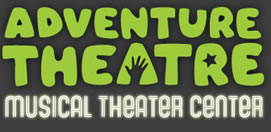
SEE ALSO:
LeeAnét Noble is new artistic director of Adventure Theatre MTC (news story September 1, 2022)
Adventure Theatre staff allege unfair pay and unsafe working conditions (reporting by Nicole Hertvik, July 30, 2022)



